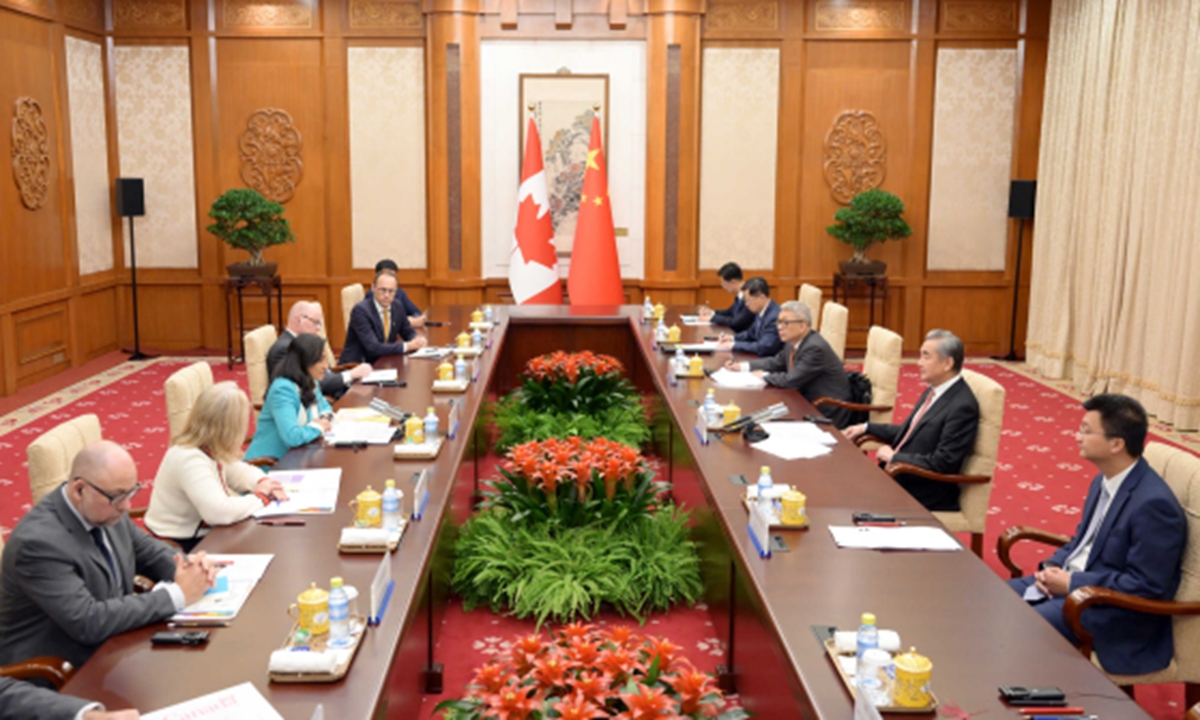Chinese Foreign Minister Wang Yi on Friday met with the visiting Canadian Minister of Foreign Affairs Anita Anand in Beijing, with both sides reaffirming willingness to enhance dialogue, exchanges and cooperation in various fields.
Citing the fact that this year marks the 55th anniversary of China-Canada diplomatic ties, Wang, also member of the Political Bureau of the Communist Party of China (CPC) Central Committee, said that Anand’s visit provides an important opportunity for both sides to revisit the original intent of establishing diplomatic relations and to advance a renewed beginning for ties.
Wang stated that China is willing to strengthen communication with Canada, enhance mutual understanding, eliminate disruptions, and rebuild mutual trust, with a forward-looking spirit to advance the improvement of bilateral relations.
China stands ready to work with Canada, guided by the important consensus of the leaders of both countries, to take the 55th anniversary of diplomatic ties and the 20th anniversary of the establishment of the strategic partnership between the two sides as an opportunity, to restart dialogues and exchanges at all levels, promote the resolution of each side’s legitimate concerns, explore and expand cooperation in various fields, increase people-to-people exchanges, strengthen communication and collaboration in multilateral affairs, jointly uphold multilateralism, safeguard the international economic and trade order, and push China-Canada relations onto a path of healthy, stable, and sustainable development as soon as possible.
Anand stated that Canadian Prime Minister Mark Carney attaches great importance to cooperation with China and is committed to recalibrating Canada-China relations, according to the Chinese Foreign Ministry.
Canada adheres to the one-China policy and is willing to strengthen high-level exchanges with China, deepen mutual trust, and make effective use of dialogue and consultation mechanisms in diplomacy, trade, and other areas to promote cooperation in trade, agriculture, tourism, energy, and cultural exchanges, Anand said, adding that Canada welcomes Chinese enterprises to invest and operate in the country.
She said Canada firmly supports multilateralism and is ready to closely coordinate with China in multilateral settings, jointly uphold the status of the UN, and support free trade, according to the Chinese Foreign Ministry.
This latest visit marks Anand’s first to China since she took office in May this year. This is also another important high-level interaction between China and Canada after the meeting between the two prime ministers on the sidelines of UNGA last month and the meeting between the two foreign ministers in Malaysia in July this year.
The interactions between Chinese and Canadian high-level officials, along with the emphasis placed by both foreign ministers on communication and dialogue, are positive signs of a thaw in strained relations, Huang Zhong, deputy dean of the Academy of International and Regional Studies at Guangdong University of Foreign Studies, told the Global Times.
Similarly, Li Haidong, a professor at the China Foreign Affairs University, stated that the ministers’ meeting between the Chinese and Canadian sides would play a positive role in promoting Beijing-Ottawa ties.
China and Canada are both confronting the challenge of safeguarding globalization and the free trade system while maintaining a firm resolve to preserve their sovereignty and independence, Li noted.
According to Li, the key for the stable and sustainable advancement of China-Canada relations hinges on Canada’s capacity to preserve its autonomy amid US pressure, diminish its over-reliance on the US, avoid having a short-sighted China policy, and embrace a more strategic and forward-thinking approach.
Ottawa seeks to deepen bilateral and multilateral economic and trade cooperation with China and other countries, diversify its trade channels, minimize the adverse effects of US’ pressures, strengthen its negotiating position, and counter unilateralism, noted Huang.
Canada should not turn to China only when facing US coercion and then distance itself from China when such pressure subsides, Li said.
While Anand’s visit to China signals Canada’s intent to mend bilateral ties, the restoration of a robust, long-term China-Canada relationship demands more concrete and pragmatic actions from the Canadian side, he said.
In 2024, China remained as Canada’s second-largest trading partner, second-largest source of imports, and second-largest export market, all following the US, according to the Chinese Foreign Ministry.
Statistics from the Canadian government shows that in 2024, China-Canada two-way merchandise trade totaled $118.7 billion, with Canadian merchandise exports to China coming to $29.9 billion, while merchandise imports were $88.8 billion.
It also underscored how people-to-people ties link Canada and China. “Over 1.7 million Canadian residents are of Chinese origin. Tourism flows and ongoing cultural exchanges enrich bilateral linkages.”
Li Weilin, Li Yu contributed to the story




